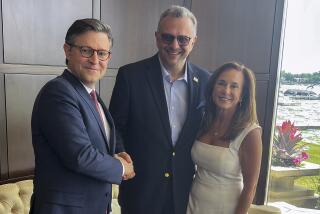At a Michigan Grill, an Arab American Voice Quizzes Cheney
- Share via
LANSING, Mich. — Imam Sayed al Hassan Qazwini had some questions for Vice President Dick Cheney on Tuesday, and he didn’t let the fact that he wasn’t a handpicked guest at Finleys American Grill stop him.
Wearing a turban and robed in brown and black, Qazwini, a religious leader born in Iraq, wanted to know if Cheney would pledge to support antidiscrimination policies to protect Muslims in the United States. And he wanted to know if the vice president remained confident Iraqi elections would still proceed in January.
Qazwini’s questions, particularly the one about discrimination, went to the heart of concerns among Arab Americans who make up a small but potentially significant bloc in Michigan, one of the battleground states in this year’s presidential race.
Arab Americans constitute 1.2% of the state’s population, and their number is growing rapidly, having increased by 51% during the 1990s.
By the time Cheney finished responding, the vice president had found a common theme: that taking the wrong course on either holding elections on time in Iraq or upholding civil rights in the U.S. would mean that terrorists had achieved their goal.
While not seated at the tables where questioners chosen by the campaign had been placed, Qazwini had been given a prominent place in the dining room, in a seat reserved for a member of Cheney’s traveling staff. He took advantage of it, injecting himself into the conversation and moving Cheney into an area of particular political sensitivity in parts of Michigan.
Qazwini told Cheney that 15 members of his family had been executed for expressing opposition to the regime of former Iraqi dictator Saddam Hussein. He said he had moved to the U.S. in 1992 and had been the leader of the nonprofit Islamic Center of America, in Detroit, for eight years.
Cheney predicted Iraqi citizens would be so anxious to take part in elections that when the voting was held, “you’ll have a very hard time keeping them away from the polls.”
The vice president said Bush administration officials were doing “our level best” to ensure that government officials in the U.S. did not engage in racial or religious profiling as part of the reaction to the Sept. 11 terrorist attacks.
“The president has been very careful not to allow a public reaction, if you will, or a set of governmental policies that single out, unfairly, individuals,” Cheney said.
Qazwini said later he was pleased with Cheney’s answer, saying, “It’s been awhile since we have heard from the administration” a declaration that Muslims should not be singled out for scrutiny and should not be held responsible “for the crimes of terrorists who came from abroad.”
But he added: “Was it sufficient? Did I expect him to say more, to engage Muslims in the campaign? Yes, I did.”
He said that as a religious leader, and as the leader of a nonprofit organization, he had not taken a public position on whom to support in the presidential race. He also said that as a voter, he had not made up his mind between Bush or Sen. John F. Kerry, the Democratic presidential nominee.
More to Read
Get the L.A. Times Politics newsletter
Deeply reported insights into legislation, politics and policy from Sacramento, Washington and beyond. In your inbox twice per week.
You may occasionally receive promotional content from the Los Angeles Times.










